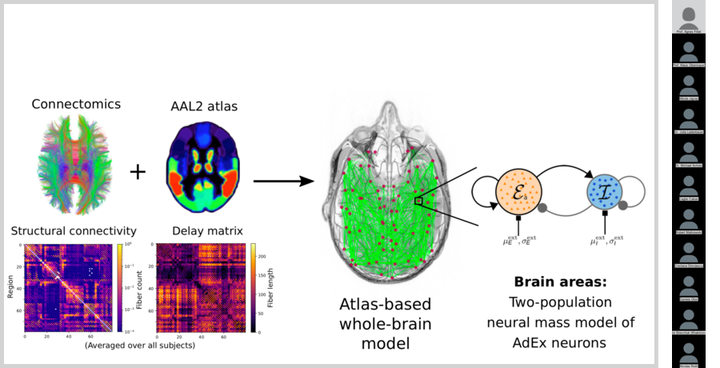B03: Modulation of memory consolidation in humans

The consolidation of hippocampus-dependent memory benefits from slow-wave sleep (SWS). A mechanism was proposed for this consolidation process, where the depolarizing ‘up’ phase of cortical slow oscillations (SO) drives the replay of newly encoded memories in the hippocampus (accompanied by sharp wave ripples and thalamocortical spindles) and mediates their long-term storage in the neocortical networks. Probing the mechanisms of sleep−dependent memory consolidation in humans, in order to understand causal relationships and to ultimately restore normal function in patients with consolidation impairments, requires manipulations of the consolidation process. We therefore propose a study that combines perturbation experiments in humans using transcranial current stimulation (tCS) applied during SWS, with a theoretical approach that mechanistically describes the interaction between the external stimulation and the global brain dynamics and which ultimately may allow for optimizing therapeutic interventions in patients.
We start with the hypothesis that the interplay between SO, spindle and ripple activity sets the “operating point” for successful memory consolidation, and we will eventually validate elements of this hypothesis by correlating brain activity patterns recorded with EEG during SWS with the behavioral assessment of consolidation success. We will first apply and empirically optimize tCS protocols, which have been used previously to enhance SO and spindle activity, and we will search for, and validate electrophysiological features that are predictive for improved behavioral performance. This search will be guided by whole-brain computational models, initially constructed to understand the patterns of SO during SWS and later extended to study SO−spindle interactions. Computational models will be tuned to reproduce SO and spindle activity recorded with EEG during SWS, and will be used to formulate and evaluate mechanistic hypotheses about the state dependent impact of tCS. tCS protocols optimized in silico for enhancing SO and spindle activity − will then be empirically validated against EEG responses and tested on SWS-dependent memory consolidation in humans, using a previously validated object recognition learning paradigm. According to our hypothesis − that a proper adjustment of the brain’s “operating point” is beneficial for memory consolidation − we expect that enhancing electrophysiological markers that have been shown to correlate with memory consolidation is already sufficient to improve behavioral performance. If so, the model-based approach will not only convey novel insights into causal relations between electrophysiological features and successful memory consolidation, but also help us to design efficient stimulation protocols which are personalized and adapted to various patient groups. Given that the amount of SWS per night significantly declines with aging (a trend accelerated in patients with Alzheimers Disease) and that the disturbed sleeping patterns contribute to deficits in memory consolidation, the results of this project may be of high clinical relevance.
SFB1315 member can access the latest unpublished results for this project on the its smartfigure gallery: